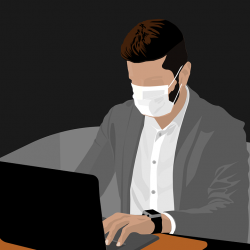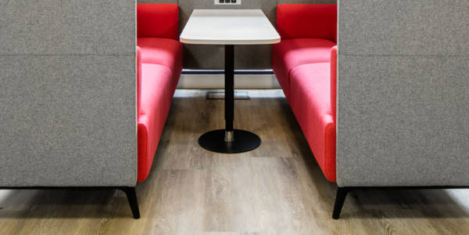October 15, 2020
Search Results for: workforce
October 13, 2020
Matrix of pain threatens new era of hybrid working life
by Jayne Smith • Flexible working, Working lives
 Organisations could be caught up in a matrix of pain if they do not carefully manage the new realities of hybrid working, claims Advanced Workplace Associates (AWA). The management consultancy has identified at least five different classes of workers and failure to create strategies to manage them could lead to a potential loss of momentum and productivity for employers. (more…)
Organisations could be caught up in a matrix of pain if they do not carefully manage the new realities of hybrid working, claims Advanced Workplace Associates (AWA). The management consultancy has identified at least five different classes of workers and failure to create strategies to manage them could lead to a potential loss of momentum and productivity for employers. (more…)
October 13, 2020
Temporary work set to increase due to uncertainty during pandemic
by Jayne Smith • Flexible working, News
 New research by digital staffing platform Coople, claims temporary work is set to surge as more than a quarter of firms (27 percent) in the UK reconsider the role agency workers have in their business. Currently, just one in six firms (15 percent) rely on a flexible workforce, with 1.5m temporary employees in the UK. (more…)
New research by digital staffing platform Coople, claims temporary work is set to surge as more than a quarter of firms (27 percent) in the UK reconsider the role agency workers have in their business. Currently, just one in six firms (15 percent) rely on a flexible workforce, with 1.5m temporary employees in the UK. (more…)
October 12, 2020
Four in ten UK workers feel their mental health is worse than a year ago
by Jayne Smith • News, Wellbeing
 A new study by independent job board, CV-Library claims four in 10 (42.9 percent) professionals feel their mental health is worse than it was a year ago. What’s more, female workers appear to be suffering more than their male counterparts (46.9 percent of women vs. 39.9 percent of men). (more…)
A new study by independent job board, CV-Library claims four in 10 (42.9 percent) professionals feel their mental health is worse than it was a year ago. What’s more, female workers appear to be suffering more than their male counterparts (46.9 percent of women vs. 39.9 percent of men). (more…)
October 9, 2020
Working from home seems to relieve the burden of imposter syndrome
by Neil Franklin • Flexible working, News, Working lives
 In a new study of around 2,000 workers conducted in partnership with the University of Nottingham, Totaljobs claims to have seen a 57 percent decrease in feelings of imposter syndrome compared to a similar survey last year, with just 3 in 10 workers in 2020 finding themselves experiencing feelings of what the study describes as Imposter Phenomenon. The 2019 study claims that 7 in 10 workers in the UK had suffered from complex ‘imposter’ feelings that can sabotage careers and harm our mental health. (more…)
In a new study of around 2,000 workers conducted in partnership with the University of Nottingham, Totaljobs claims to have seen a 57 percent decrease in feelings of imposter syndrome compared to a similar survey last year, with just 3 in 10 workers in 2020 finding themselves experiencing feelings of what the study describes as Imposter Phenomenon. The 2019 study claims that 7 in 10 workers in the UK had suffered from complex ‘imposter’ feelings that can sabotage careers and harm our mental health. (more…)
October 9, 2020
As a workplace professional, how many hats do you wear to work?
by Karina Tissnes • Comment, Facilities management, Workplace
 Throughout your time being with a company, have more responsibilities been added to your typical workday that were not expected originally? Did you offer to help with something outside of your job, then have it become part of your daily duties? If so, you’re not alone. Companies often look for ways to save money, and sometimes that means piling work on people who are already on the roster. Wearing many hats at work happens often, but how does it impact the employees that carry the extra burden? In a new study, ZenBusiness – a company that helps people start, run, and grow their own business – asked more than 1,000 current employees about the various functions they serve, what they think is fair, and how workloads have changed due to the COVID-19 pandemic. (more…)
Throughout your time being with a company, have more responsibilities been added to your typical workday that were not expected originally? Did you offer to help with something outside of your job, then have it become part of your daily duties? If so, you’re not alone. Companies often look for ways to save money, and sometimes that means piling work on people who are already on the roster. Wearing many hats at work happens often, but how does it impact the employees that carry the extra burden? In a new study, ZenBusiness – a company that helps people start, run, and grow their own business – asked more than 1,000 current employees about the various functions they serve, what they think is fair, and how workloads have changed due to the COVID-19 pandemic. (more…)
October 8, 2020
The workplace has reached an inflection point as it adjusts to new realities
by Robin Davies • Comment, Facilities management, Technology, Workplace design
 We can confidently say this is a new era for the workplace. Covid-19 has forced a radical rethink about the purpose of the office and its role in reaffirming company culture. Enlightened property directors are resisting knee-jerk responses to predictions that Covid spells the demise of the office including the wholesale migration to home-working. Instead, they are challenging plans to dramatically downsize the workplace and corporate real estate. They are also acutely aware that distancing, transmission and sanitisation are here for the long-haul. This will continue to have a profound impact on occupancy levels and the interactions that are necessary for business success. (more…)
We can confidently say this is a new era for the workplace. Covid-19 has forced a radical rethink about the purpose of the office and its role in reaffirming company culture. Enlightened property directors are resisting knee-jerk responses to predictions that Covid spells the demise of the office including the wholesale migration to home-working. Instead, they are challenging plans to dramatically downsize the workplace and corporate real estate. They are also acutely aware that distancing, transmission and sanitisation are here for the long-haul. This will continue to have a profound impact on occupancy levels and the interactions that are necessary for business success. (more…)
October 8, 2020
Most people with mental health issues would prefer a robot therapist to a human
by Jayne Smith • News, Technology, Wellbeing
 2020 has been the most stressful year in history for the global workforce and people want robots to help, according to a new study by Oracle and Workplace Intelligence, an HR research and advisory firm. The study of more than 12,000 employees, managers, HR leaders, and C-level executives across 11 countries claims that the COVID-19 pandemic has increased workplace stress, anxiety, burnout and other mental health issues for people all around the world, and would prefer a robot instead of other people to help. (more…)
2020 has been the most stressful year in history for the global workforce and people want robots to help, according to a new study by Oracle and Workplace Intelligence, an HR research and advisory firm. The study of more than 12,000 employees, managers, HR leaders, and C-level executives across 11 countries claims that the COVID-19 pandemic has increased workplace stress, anxiety, burnout and other mental health issues for people all around the world, and would prefer a robot instead of other people to help. (more…)
October 5, 2020
People not fully aware of remote work monitoring tech
by Neil Franklin • Flexible working, News, Technology
 The majority of people are not aware of the nature of new remote work monitoring technology, but do not like the idea of it. According to a new polling commissioned by the Prospect union, around two thirds of workers are uncomfortable with workplace tech like keystroke and camera monitoring and wearables being used when working remotely. (more…)
The majority of people are not aware of the nature of new remote work monitoring technology, but do not like the idea of it. According to a new polling commissioned by the Prospect union, around two thirds of workers are uncomfortable with workplace tech like keystroke and camera monitoring and wearables being used when working remotely. (more…)
October 2, 2020
Time for businesses to establish more meaningful wellbeing initiatives
by Jolawn Victor • Comment, Wellbeing
 Over the years, mental health has become a prominent feature of wellbeing initiatives in many businesses, but especially in the wake of the pandemic. However, our research has found that more than half of the UK workforce (54 percent) do not feel that mental health benefits are a priority in their organisation. This is despite half of workers believing that mental health benefits are essential post-COVID-19. (more…)
Over the years, mental health has become a prominent feature of wellbeing initiatives in many businesses, but especially in the wake of the pandemic. However, our research has found that more than half of the UK workforce (54 percent) do not feel that mental health benefits are a priority in their organisation. This is despite half of workers believing that mental health benefits are essential post-COVID-19. (more…)
October 2, 2020
What (nearly) everybody gets wrong about work and the coronavirus
by Mark Eltringham • Comment, Flexible working, Workplace design
 You’ve probably read and heard dozens, or even hundreds, of different viewpoints about the effect of the pandemic on the world of work. Most of them (until recently perhaps) have dished up one of the two binary options as part of a zero-sum game. Many are based on hackneyed ideas and expressed as clichés. (more…)
You’ve probably read and heard dozens, or even hundreds, of different viewpoints about the effect of the pandemic on the world of work. Most of them (until recently perhaps) have dished up one of the two binary options as part of a zero-sum game. Many are based on hackneyed ideas and expressed as clichés. (more…)








 With current government advice encouraging all those who can work from home to do so, it’s no surprise that Britain’s businesses and employees are navigating a new normal. New research from
With current government advice encouraging all those who can work from home to do so, it’s no surprise that Britain’s businesses and employees are navigating a new normal. New research from 


















October 14, 2020
Many people are demoralised, disconnected and worried. We need to talk about that.
by Steven Buck • Comment, Wellbeing, Working lives